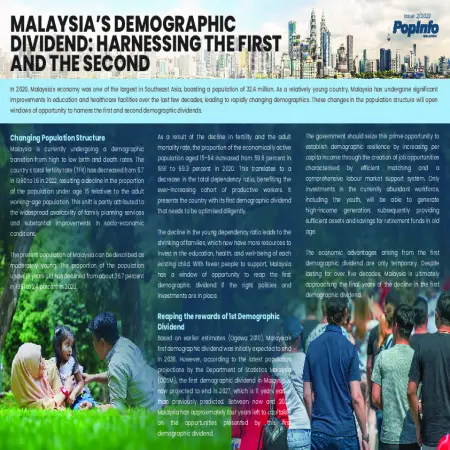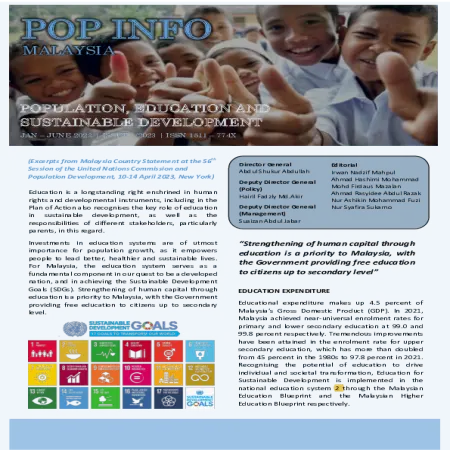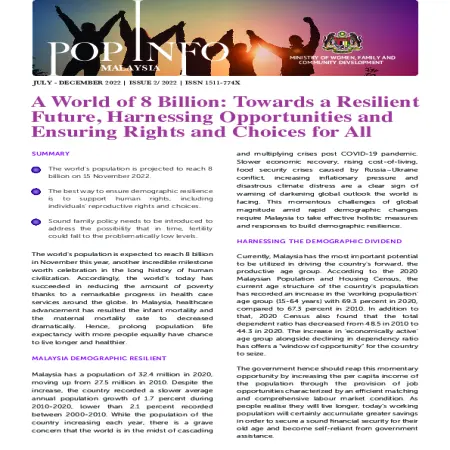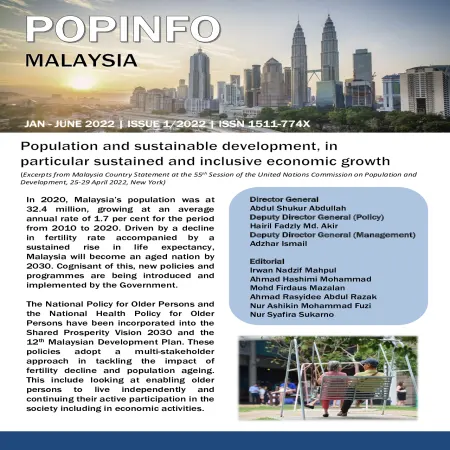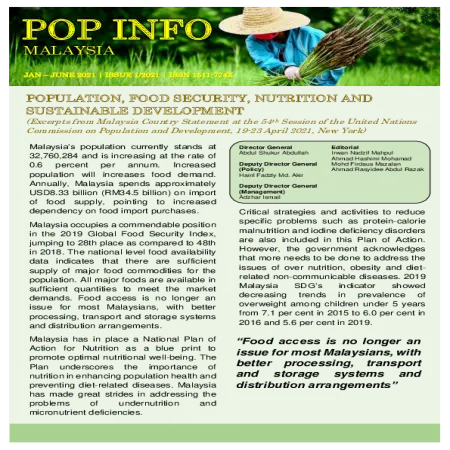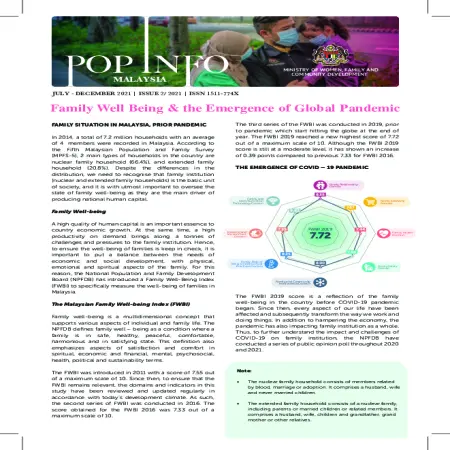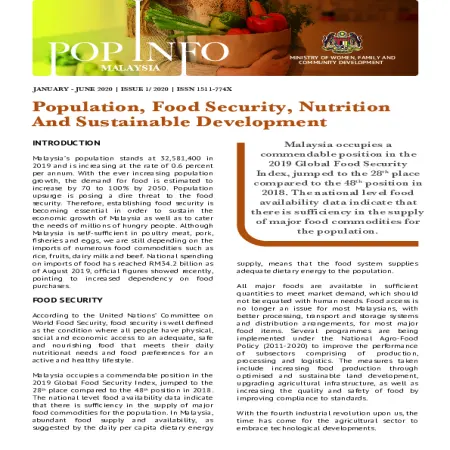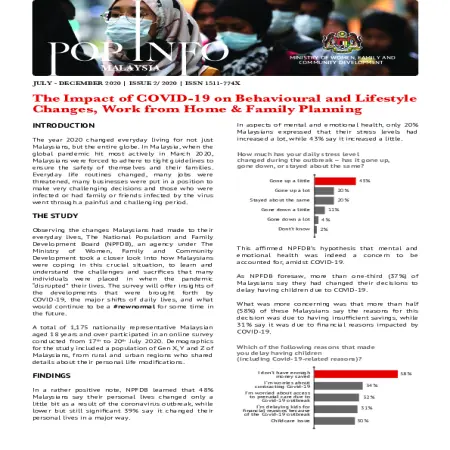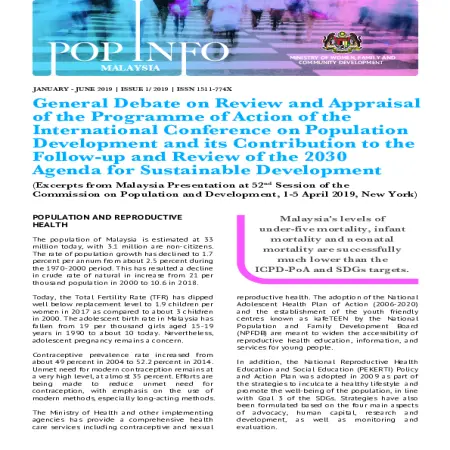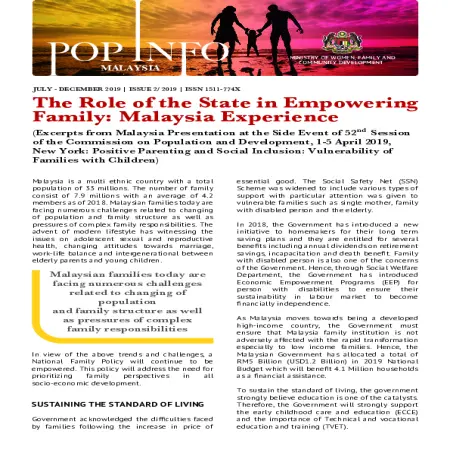Browse by Type
Results for Item type : "Newsletter"
|
|
Malaysia's demographic dividend: harnessing the first and the second
Item Type: Newsletter
Editor:
Year: 00/12/2023
Abstract: In 2020, Malaysia's economy was one of the largest in Southeast Asia, boasting a population of 32.4 million. As a relatively young country, Malaysia has undergone significant improvements in education and healthcare facilities over the last few decades, leading to rapidly changing demographics. These changes in the population structure will open windows of opportunity to harness the first and second demographic dividends.
|
|
|
|
|
|
Population, education and sustainable developmet
Item Type: Newsletter
Editor:
Year: 00/06/2023
Abstract: Education is a longstanding right enshrined in human rights and developmental instruments, including in the Plan of Action also recognises the key role of education in sustainable development, as well as the responsibilities of different stakeholders, particularly parents, in this regard.
Strengthening of human capital through education is a priority to Malaysia, with the Government providing free education to citizens up to secondary level. Malaysia is also undertaking efforts to ensure that the education system is robust, resilient and fit for the future.
|
|
|
|
|
|
A world of 8 billion: Towards a resilient future, harnessing opportunities and ensuring rights and choices for all
Item Type: Newsletter
Editor:
Year: 00/11/2022
Abstract: The world's population is projected to reach 8 billion on 15 November 2022. The best way to ensure demographic resilience is to support human rights, including individuals' reproductive rights and choices.
|
|
|
|
|
|
Population and sustainable development, in particular sustained and inclusive economic growth
Item Type: Newsletter
Editor:
Year: 00/05/2022
Abstract: In 2020, Malaysia's population was at 32.4 million, growing at an average annual rate of 1.7 per cent for the period from 2010 to 2020. Driven by a decline in fertility rate accompanied by a sustained rise in life expectancy. Malaysia will become an aged nation by 2030.
|
|
|
|
|
|
Population, food security, nutrition and sustainable development
Item Type: Newsletter
Editor:
Year: 00/00/2021
Abstract: Malaysia occupies a commendable position in the 2019 Global Food Security Index, jumping to 28th place as compared to 48th in 2018. The national level food availability data indicates that there are sufficient supply of major food commodities for the population. All major foods are available in sufficient quantities to meet the market demands. Food access is no longer an issue for most Malaysians, with better processing, transport and storage systems and distribution arrangements.
|
|
|
|
|
|
Family well being & the emergence of global pandemic
Item Type: Newsletter
Editor:
Year: 00/00/2021
Abstract: National Population and Family Development Board (NPFDB) has introduced a Family Well-Being Index (FWBI) to specifically measure the well-being of families in Malaysia. The third series of the FWBI was conducted in 2019, prior to pandemic which start hitting the globe at the end of year. The FWBI 2019 reached a new highest score of 7.72 out of a maximum scale of 10. Although the FWBI 2019 score is still at a moderate level, it has shown an increase of 0.39 points compared to previous 7.33 for FWBI 2016. The FWBI 2019 score is a reflection of the family well-being in the country before COVID-19 pandemic began. Since then, every aspect of our life have been aff¬ected and subsequently transform the way we work and doing things. In addition to hampering the economy, the pandemic has also impacting family institution as a whole.
|
|
|
|
|
|
Population, food security, nutrition and sustainable development
Item Type: Newsletter
Editor:
Year: 00/00/2020
Abstract: Malaysia occupies a commendable position in the 2019 Global Food Security Index, jumped to the 28th place compared to the 48th position in 2018. The national level food availability data indicate that there is sufficiency in the supply of major food commodities for the population.
|
|
|
|
|
|
The impact of COVID-19 on behavioural and lifestyle changes, work from home & family planning
Item Type: Newsletter
Editor:
Year: 00/00/2020
Abstract: This survey will offer insights of the developments that were brought forth by COVID-19, the major shifts of daily lives, and what would continue to be a #newnormal for some time in the future.
|
|
|
|
|
|
General debate on review and appraisal of the programme of action of the International Conference on Population Development and its contribution to the follow - up and review of the 2030 agenda for sustainable development
Item Type: Newsletter
Editor:
Year: 00/00/2019
Abstract: The Population of Malaysia is estimated at 33 million today with 3.1 million are non-citizens. The rate of population growth has declined to 1.7 per cent per annum from about 2.5 per cent during the 1970-2000 period. Malaysia is moving towards becoming one of the aged countries by 2030. The fast pace of ageing population is as a result of longer life expectancy and rapid decline in Total Fertility Rate (TFR).
|
|
|
|
|
|
The role of the state in empowering family: Malaysia experience
Item Type: Newsletter
Editor:
Year: 00/00/2019
Abstract: Malaysia families today are facing numerous challenges related to changing of population and family structure as well as pressure of complex family responsibilities. The advent of modern lifestyle has witnessing the issues on adolescent sexual and reproductive health, changing attitudes towards marriage, work-life balance and intergenerational between elderly parents and young children. In view of the above trends and challenges, a National Family Policy will continue to be empowered.
|
|
|
|





